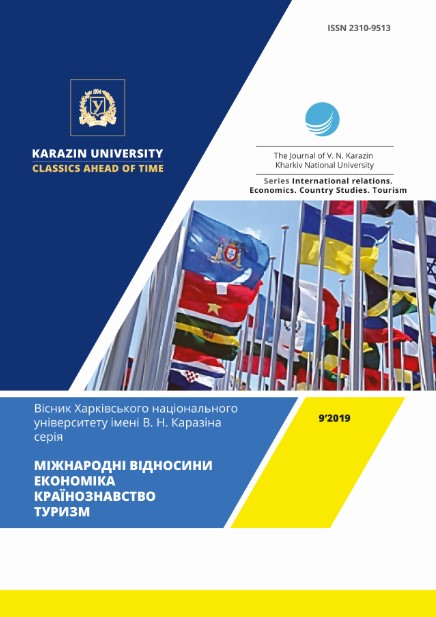Modern interaction of man and society in the conditions of global development: national interests
Abstract
The conditions for the development of the modern world create an image of a man whose existence is impossible without a variety of relationships with society. It is globalization that dictates the need to consider the universal laws of development of the new format of the human model in interaction with society. In everyday life, the concept of loneliness of the smallest part of the universe – man is sharpened. The subject of the research is the forms of interaction between a person and society in the context of global development in the context of national interests. The goal of the work is to reveal the essence of modern interaction between a person and society in the context of global development through the prism of national interests. The objective: to explore the features of the interaction of man and society in the context of globalization through the prism of national interests; find out the reasons for the transformation of national interests into global ones; analyze conflict and cooperation, as a form of interaction between man and society. General scientific methods: analysis, synthesis, hypothetical method. The following results: the replacement of national interest with globalization is one of the pressing globalization challenges of modern social development, which is impossible without taking into account global interest. Personal interest must be realized both in society and at the national level. Now we are in the process of forming a new consciousness; therefore, a modern person, unfortunately, is still not able to clearly define his own national priorities on a conscious or subconscious level. Conclusions: you should always take into account the context in which the power potential is realized. Speaking about national interests, they usually mean the state or public welfare, however, due to the diversity of personalities, everyone sees his own way on the path of well-being and security.
Downloads
References
Dahl, R. (1968). Power International Encyclopedia of the Social Science XII. New York: Free Press.
Geschiere, P., & Meyer, B. (1998). Globalization and Identity: Dialectics of Flows and Closures. Development and Change. The Hague. 4, Vol. 29, 601-615.
Hemelink, C. (1995). World Communication. Disempowerment & Self-Empowerment. London and New Jersey: Zed books
Laswell, H., & Kaplan, A. (1963). Power and Society. New Haven: Yale University Press.
Shkiljnyj dovidnyk: zbirka shkiljnykh pidruchnykiv. (n.d.) Vzajemodija ta vzajemorozuminnja v konteksti etyky ta kuljtury dilovogho spilkuvannja. Dovidnyk z psykhologhiji. Vzjato z http://school.home-task.com/viznachennya-vzayemodiї-vzayemodiya-ta-vzayemorozuminnya-v-konteksti-etiki-ta-kulturi-dilovogo-spilkuvannya/
Shynkaruk, V. I. (Red.). (2002). Vzajemodija. Filosofsjkyj encyklopedychnyj slovnyk. Kyjiv: Abrys.
Komleva, N. (2003). Geopoliticheskoe szhatie. MEiMO, 2, 66-75.
Kuchuradi, I. (2003). Spravedlivost – sotsialnaya i globalnaya. Voprosy filosofii, 9, 17-29.
Lisnichuk, O. (2001). Nacionaljni interesy Ukrajiny: poshuk koncepciji. Nova bezpeka, 1, 35.
Parunova, Yu. D. (2005). Kontseptsii sotsializatsii cheloveka KhKh veka. Kultura narodov Prichernomorya, 61, 121-123.
Smit, E. D. (1994). Nacionaljna identychnistj. K.: Osnovy.
Ghorodjanenko, V. Gh. (Red.). (2002). Sociologhija. K.: Vydavnychyj centr «Akademija».
Shalenko, V. N. (2003). Sotsiologiya. M.: Proekt.
Authors who publish with this journal agree to the following terms:
- Authors retain copyright and grant the journal right of first publication of this work under the terms of a license Creative Commons Attribution License 4.0 International (CC BY 4.0).
- Authors are able to enter into separate, additional contractual arrangements for the non-exclusive distribution of the journal's published version of the work (e.g., post it to an institutional repository or publish it in a book), with an acknowledgement of its initial publication in this journal.
- Authors are permitted and encouraged to post their work online (e.g., in institutional repositories or on their website) prior to and during the submission process, as it can lead to productive exchanges, as well as earlier and greater citation of published work.




